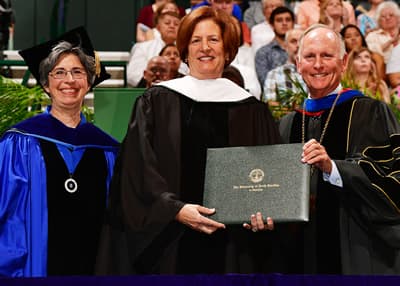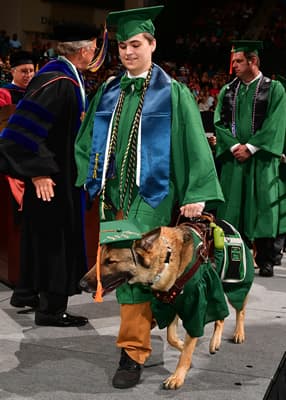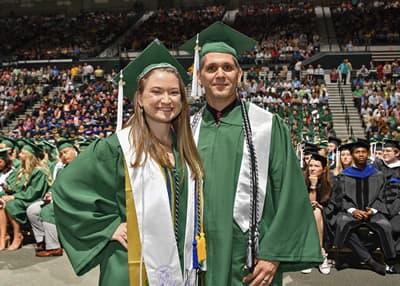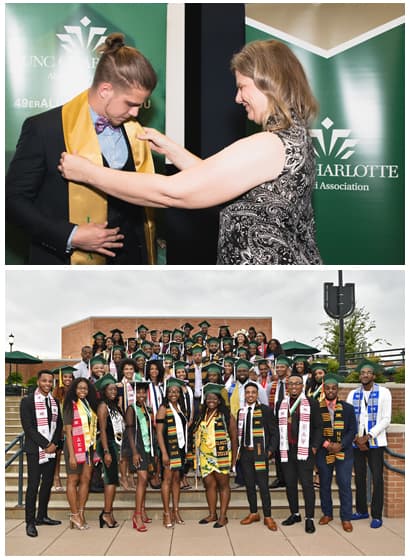
UNC Charlotte conferred degrees upon 4,565 candidates in three ceremonies Friday and Saturday, May 11-12. Retired superintendent of Charlotte-Mecklenburg Schools Ann Clark received an honorary Doctor of Public Service at the 10 a.m., Saturday, event.
Ophelia Garmon-Brown, chief community wellness and health equity executive at Novant Health and co-chair of the Charlotte-Mecklenburg Opportunity Task Force, also received an honorary Doctor of Public Service during Friday’s Commencement exercises.
 One of the highlights of Saturday morning’s exercise was mechanical engineering student Taylor Marceau’s journey with service dog Czar. In fall 2017, Marceau was largely wheelchair reliant due to severe joint, muscle and nerve pain. At that time, her connective tissue disorder, Ehlers-Danlos Syndrome, worsened and interrupted her studies.
One of the highlights of Saturday morning’s exercise was mechanical engineering student Taylor Marceau’s journey with service dog Czar. In fall 2017, Marceau was largely wheelchair reliant due to severe joint, muscle and nerve pain. At that time, her connective tissue disorder, Ehlers-Danlos Syndrome, worsened and interrupted her studies.
At Commencement, she walked across the stage to accept a bachelor’s degree in mechanical engineering, and she is on track to complete a second bachelor’s degree in computer science in December 2018.
Another special moment occurred at Saturday afternoon’s Commencement when father and daughter Harry (Butch) and Marisa McLaughlin were awarded bachelor’s degrees in psychology.
Butch McLaughlin, who earned a two-year degree in criminal justice, realized the completion of a bachelor’s degree after nearly 30 years of marriage, children and full-time work.
“Marisa had been accepted into UNC Charlotte with the plan to pursue a degree in exercise science and potentially physical therapy,” said McLaughlin. “After visiting the campus and attending orientation, I began to again have thoughts of finishing my degree. We had many family discussions about selecting a path, staying the course but adjusting and adapting as the need arose, that I felt the pull to be a leader by example.”
 Marisa McLaughlin changed majors, and she and her father opted for psychology degrees with a concentration in industrial/organizational psychology.
Marisa McLaughlin changed majors, and she and her father opted for psychology degrees with a concentration in industrial/organizational psychology.
“We took several classes adjacent to each other semester-wise but never at the same time and often found ourselves talking about what we'd learned and its implications for society and the business world on our Saturday morning walks,” Butch McLaughlin stated. “I’m now a first-generation grad in my family, making Marisa a ‘legacy’ student by a mere minute or two.”
Beyond the thousands of family and friends who attended on-campus Commencement exercises, many others joined in the festivities through the live stream and Facebook Live provided by the Office of University Communications.
Viewers tuned in from 119 countries – the largest international contingent was from India. Overwhelming, the majority watched via a mobile device (approximately 75 percent).
View photos from Commencement on Flickr.
Also, new for Commencement 2018, doctoral students were hooded in a separate ceremony on Thursday, May 10. In addition, the UNC Charlotte Alumni Association held a series of special events on Thursday.
 The first-ever Legacy Draping Ceremony was conducted with 16 students who had at least one parent, stepparent or grandparent that graduated from UNC Charlotte. According to Alumni Association officials, future graduating legacies will have an opportunity to attend this new tradition each semester prior to Commencement.
The first-ever Legacy Draping Ceremony was conducted with 16 students who had at least one parent, stepparent or grandparent that graduated from UNC Charlotte. According to Alumni Association officials, future graduating legacies will have an opportunity to attend this new tradition each semester prior to Commencement.
The Alumni Affairs Office, the Black Alumni Chapter and the Multicultural Resource Center cosponsored a “Donning of the Kente” event. James Mitchell, a member of the Charlotte City Council, was the featured speaker. Seventy-five students participated; they received handmade Kente clothes that represented their African heritage and achievements.
Another annual tradition is the Ring Ceremony; 100 students received their class rings at the Popp Martin Student Union. Afterward, they were encouraged to dip their ring into Norm’s miner pan to strengthen their ties to UNC Charlotte and its founding as a pioneering institution of opportunity.